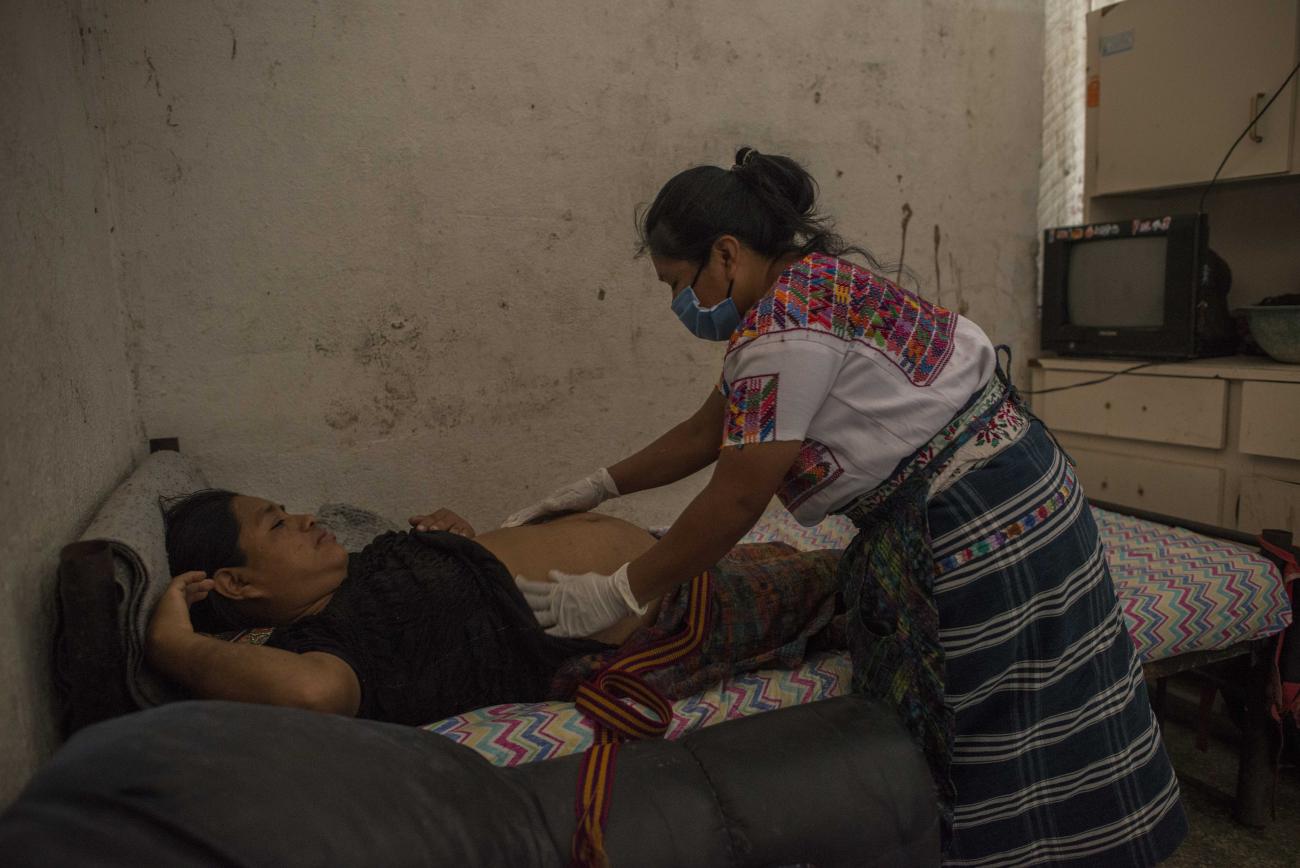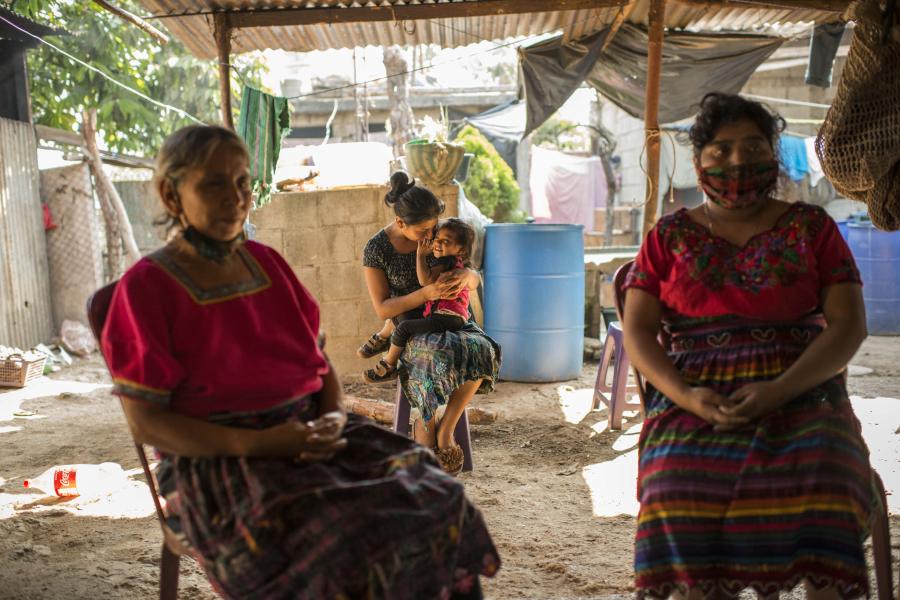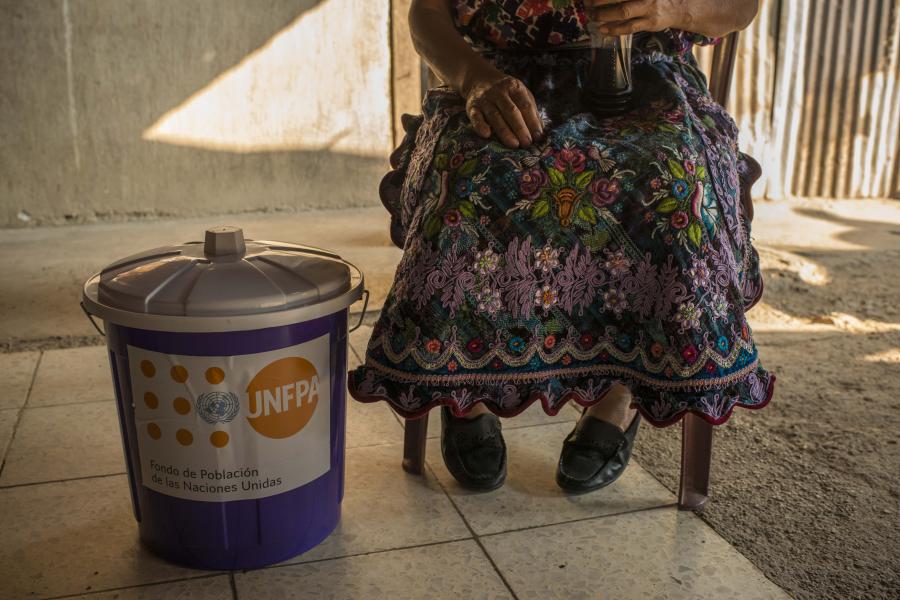The gift of accompanying childbirth

"Health is our commitment, that is why God has chosen us," says Xot regarding the crucial role that, according to the Mayan worldview, midwives’ practice.
"Health is our commitment, that is why God has chosen us," says Xot regarding the crucial role that, according to the Mayan worldview, midwives’ practice.
"It already fit, it is well positioned," affirms Rosa Lidia Xot Gómez with sweetness, behind her light blue mask, after having caressed the swollen belly of María Magdalena Zurdo with latex gloves, about to give birth, in the dim light of the humble corridor of the two-level house where the future mother lives together with her husband, her first child and two other relatives.
This is the third visit that the 44-year-old midwife has made to her patient's home. “From the third month of pregnancy, I generally visit future moms once a month. In this case, I could not do it with the same constancy as always, but the lady is in good health and never had problems, I have always kept abreast of the situation,” says Xot, with the serenity of his 30 years of practice and the more than 300 childbirths attended.
María Magdalena Zurdo, is one of the twenty mothers that the midwife has cared for since the beginning of the pandemic. She is a housewife, she depends, along with the rest of her family, on the salary of 40 quetzals a day that her husband brings as a laborer, not every day. At the end of the narrow gray corridor where she is cared for by the midwife, a wider and brighter environment can be seen, the patio, where the presence of a domestic altar stands out, with some sacred images and flowers, surrounded by an infinity of tanks and buckets of different sizes to store water.
In Chuarrancho, a municipality where the two ladies live, located 30 kilometers from the capital city - and an hour and a half by public transport - there is almost no drinking water, and in all the houses of the town it is common to see towers of containers of various volumes ready for carrying water from the community wells.
According to data from the National Institute of Statistics (INE), the department of Guatemala, to which Chuarrancho belongs, has a poverty level of 33.3%. For its part, the figures managed by the Secretariat for Food and Nutrition Security (SESAN) place Chuarrancho as a municipality with moderate nutritional vulnerability. In the middle of this already complex socio-economic environment, the pandemic was inserted adding one more difficulty in the lives of people, who do not give up, accustomed to facing daily obstacles.

"Fortunately, people are taking good care of themselves here in the town and in the villages, and there are not so many cases of contagion," says Xot. "There was even a decrease in pregnancies", continues in her analysis the midwife, who, at the same time, underlines the importance of her home work during these long months of the pandemic, "since people are more afraid of going to a hospital, for fear of catching it.”
Xot has never stopped caring for pregnant women, not even during curfew periods or on weekends. "Health is our commitment, that's why God has chosen us," says Xot regarding the crucial role that, traditionally, according to the Mayan worldview, midwives’ practice, who were born in a cultural context where the sense of community and service to others prevails. From a very young age they receive the sacred "gift" of attending childbirth, which they perfected by accompanying the most experienced midwives.
“During curfews, I was a little scared walking alone, but I armed myself with courage and did not forget to bring my license. I treated pregnant women up to Tierra Caliente,” she asserts, referring to a distant village, located approximately 15 kilometers from the municipality.
At a distance of a decade from the recognition that the Ministry of Public Health and Social Assistance (MSPAS, by its acronym in Spanish) gave to the work of midwives, giving them an institutional license, Xot also highlights the more than ten years that they have been working hand in hand with the Fund for Population of the United Nations (UNFPA), which has accompanied the work of midwives, providing them with technical equipment and contributing to the development of the National Midwives Policy and its operational plan, promoting a model of knowledge exchange between the institutions and midwives traditional.
A few blocks from the home of María Magdalena Zurdo, at the home of Marcela Gómez Xuyá, another older midwife, 61, uses one of the kits that United Nation Population Fund (UNFPA) has just donated to the group of midwives in the region: in a bucket there are masks, gloves, face shields and a towel. These kits were acquired through the Joint Support Program for humanitarian response in health and dignified quarantine for migrants returned during the first months of the COVID-19 pandemic, whose objective was to save lives.
Xuyá confirms the downward trend in the childbirths attended during the last year of the pandemic: in her notebook she has 18. Illiterate, she is supported by her husband with the registration of cases attended, reported with great care and scruples. Despite the lower number of childbirths, she highlights a premature childbirth and two 16-year-old women who gave childbirth. Despite not having faced a quantitatively intense year, difficult situations were not lacking.
"Once I had to attend to a pregnancy of a 13-year-old girl, and since the age of 15 there are many girls who still get pregnant," declares the elderly midwife, with a stern look, aware of the difficult situation that causes the childbirths of minors. age." “That is why I always report the information to the authorities, it is a huge responsibility when it comes to teenagers."
Next to Xuyá, Abigail Monroy Xuyá sits, representative of the women's sector within the council of indigenous authorities of the community, the ancestral government that supports political power in Chuarrancho along with the municipal authority of the mayor and Community Development Councils (COCODE.) Abigail Monroy usually accompanies the visits of midwives in risky situations, to protect them against the law and help the midwives' medical care work with the legal assistance part. This is also the objective of UNFPA accompaniment work over these 10 years: the empowerment of midwives also encompasses the legal issue of their service.
20 days after visiting the midwives of Chuarrancho, Rosa Lidia Xot says that the daughter of María Magdalena Zurdo was born a few days late. For this reason, she ended up giving birth at the Roosevelt National Hospital in Guatemala, since the midwife recommended going to the hospital to avoid any problems. The rainy season has begun and, despite continuing under the pandemic regime, there will be a little more water even in the community pipes.
For UNFPA, the articulated work between the traditional midwives and the institutions, from a practice of peer exchange, is one of the ways to solve the problems that girls, adolescents, women and pregnant women face, therefore the importance of continuing to contribute to these articulation practices, hoping in the future a mutual recognition of the role that each party perform in the human development of families and communities, and in the health of women.
Translated by: Jackeline Lemus
University intern - UMG


